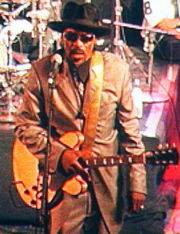Go-go is defined by continuous, complex, heavy rhythm arrangements focused through two motifs performed on multiple congas, tumbadoras, and rototoms, interspersed with timbale and cowbell parts, driven by heavy-footed drumming and punctuated by crowd call-and-response. A swing rhythm is often implied (if not explicitly stated).
Some go-go bands have seen varying degrees of success nationally and worldwide, but Washington, D.C. remains the preeminent center for the music.
Contents |
History
 Go-go pioneer Chuck Brown perfoming at the 2005
Duke Ellington Jazz Festival.
Go-go pioneer Chuck Brown perfoming at the 2005
Duke Ellington Jazz Festival.
Chuck Brown, a fixture on the Washington music scene with Chuck Brown & the Soul Searchers ("We the People", "Ashley's Roachclip"), inspired other local bands in the mid-1970s to incorporate go-go music more and more into their standard live shows. This included the funk-driven Trouble Funk and the rock-influenced E.U., who became the most popular bands on the go-go music scene by the end of the 70s. Brown's 1979 hit single "Bustin' Loose" was the culmination of go-go music's early success. Trouble Funk briefly signed with New Jersey's Sugar Hill Records, where they released the minor hit "Pump Me Up". E.U. scored a national hit when they performed their song "Da Butt" in the motion picture School Daze in 1988.
The next generation of go-go featured The Junk Yard Band and Rare Essence, two enduring bands that gained popularity after go-go had become established. The Junk Yard Band began as a group of children as young as nine years old, performing music on a hodge-podge of discarded items fashioned into musical instruments. They signed and toured with New York's Def Jam Records, where they released the 12-inch single "The Word". Rare Essence, who was mentored at a young age by Chuck Brown, signed briefly with Mercury Records, but both bands' prominence were primarily established in and around Washington and the Mid-Atlantic area.
Many of these bands still perform today, along with successive generations of bands. Go-Go is always performed live at nightclubs, neighborhood parties, and sometimes with famous singers. Go-Go initially spread through the distribution of free cassette tapes, and is now found locally in the Maryland, Washington D.C., and Virginia area for sale on CDs.
Go-go clubs sometimes acquired a reputation for violence, and in some areas of Washington, clubs are not permitted to play go-go or have go-go bands appear. One well-publicized venue with trouble was Club U, located inside a DC government building at the corner of 14th Street NW and U Street NW, where a murder and other incidents happened before the club was closed.[1]
Popular go-go bands and songs
First generation
- Chuck Brown ("Bustin Loose," "That'll Work," "Money")
- E.U. (Experience Unlimited) ("Da Butt," "EU Freeze," "Future Funk")
- Trouble Funk ("Pump Me Up," "Drop the Bomb," "E Flat Boogie")
- Little Benny and the Masters ("Who came to boogie")
Second generation
- Backyard Band ("91 Dope Jam", "Unibomber", "Skillet", "Thug Passion", "Keep it Gangsta", "Pretty Girls", "Fakin Like")
- Junk Yard Band ("Sardines," "Rough it Off," "Go Hard")
- Northeast Groovers ("The Rumble," "Off the Muscle," "The Water")
- Rare Essence ("Lock It," "Work the Walls," "Body Moves," "Overnight Scenario")
Hybrid Go-go and R&B bands
- After Hours Band
- Da Measures Band/DrasticMeasuresBand
- Familiar Faces
- L!SSEN Band
- Soul Patrol
- Suttle Thought
External links
- GoGoRadio GoGo radio station
- Take Me Out to the Go-go
- The History of Go-go
- Go-go Music from the All Music Guide
- Washingtonpost.com MP3 -list of gogo bands with free downloads.
Categories: American styles of music




 216.73.216.133
216.73.216.133 User Stats:
User Stats:
 Today: 0
Today: 0 Yesterday: 0
Yesterday: 0 This Month: 0
This Month: 0 This Year: 0
This Year: 0 Total Users: 117
Total Users: 117 New Members:
New Members:
 216.73.xxx.xxx
216.73.xxx.xxx
 Server Time:
Server Time: